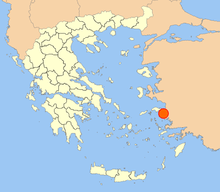Milesian school
The Milesian school (/maɪˈliːʃiən, -ʃən/) was a school of thought founded in the 6th century BC. The ideas associated with it are exemplified by three philosophers from the Ionian town of Miletus, on the Aegean coast of Asia Minor: Thales, Anaximander, and Anaximenes. They introduced new opinions contrary to the prevailing belief of how the world was organized, in which natural phenomena were explained solely by the will of anthropomorphized gods. The Milesians conceived of nature in terms of methodologically observable entities, and as such was one of the first truly scientific philosophies.
The Milesian school is not synonymous with the Ionian, which includes the philosophies of the Milesians plus distinctly different Ionian thinkers such as Heraclitus. The Ionian School contains the three philosophers that form the Milesian School as well as a few more who were added on during the 5th Century, but the Ionian School looked more into the thought behind everything while the Milesian School was more focused on nature.[1]
See also
- History of metaphysical naturalism
- Ionian Enlightenment
- Ionian School (philosophy)
- Pre-Socratic philosophy
References
- "Milesian School - By Movement / School - The Basics of Philosophy". www.philosophybasics.com. Retrieved 2018-12-05.
Bibliography
- Lahaye, Robert. La philosophie ionienne. L'École de Milet, Cèdre, Paris, 1966.
